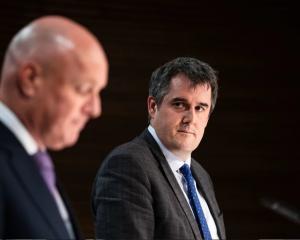And, if so, who should get the chop when it comes to Wellington's mandarins displaying some accountability for this debacle?
The short answer to the first question is that any resignations should await the report and recommendations of the independent inquiry which the Prime Minister has flagged.
That investigation needs to determine who or what was at fault to enable Smith to execute his carefully contrived plan to flee the country - as well as uncovering why it was not until some 48 hours later that the Corrections Department checked whether he was complying with the conditions of his three-day release.
Only then can blame be sheeted home for the various cracks in the system through which Smith squeezed to temporary freedom.
Some of these were caused by failures of communication and co-ordination between government agencies.
On that score, the inquiry needs to answer two highly pertinent questions.
First, was this unfortunate episode the direct result of a lack of urgency on the part of government agencies to thrash out information-sharing agreements to ensure people who are trouble, such as sex offenders, are identified as such before they cause it?
Second, was the hopelessly inadequate monitoring of someone who is a convicted killer the product of continual cuts to the Corrections Department's annual budget, which officials have privately told ministers is one of those now ''under considerable pressure''?
Overall, the department is obviously the one with the most questions to answer.
It has accepted responsibility for a major lapse in its oversight of Smith during the increasingly lengthy periods he was on temporary release.
In hindsight, the department now accepts Smith should have been required to wear an electronic bracelet which would have given his location via GPS.
Corrections was not alone in making basic errors in Smith's case, however.
The police were culpable in Smith being able to renew his passport.
That was applied for and issued in Smith's real name of ''Traynor''.
Using his birth name did not raise any ''red flags'' at the Passport Office because the police had always charged the repeat offender under the name of ''Smith'' even though he had not changed his name from Traynor to Smith by deed poll.
The police's decision is puzzling because both the Corrections Department and the Parole Board knew of Smith's use of ''Traynor''.
The upshot, however, is to spread the blame. The more diffuse it becomes, the less likely heads will roll.
When it comes to whose heads, it is inconceivable that either Corrections Minister Sam Lotu-liga or Police Minister Michael Woodhouse will be required to fall on their swords.
Both cabinet ministers have held their respective portfolios for barely a month.
They cannot yet be held responsible for what they have inherited.
It has anyway long been in question whether individual ministerial responsibility is a constitutional convention.
In actuality, ministerial resignations or sackings are really a function of political circumstances.
There are no clear rules and precedent can be and is ignored.
A determining factor is the practical question of whether the minister can survive if something goes drastically wrong in one of his or her portfolios, rather than one of principle.
Even then, prime ministers do not necessarily rush into sacking a colleague unless there are strong grounds.
That was evident in National's Denis Marshall finally resigning as Minister of Conservation a year after the Cave Creek tragedy.
He retained his other portfolios, however, along with his ministerial perks.
Likewise, Kate Wilkinson was relieved of her labour portfolio by John Key some time after the royal commission on the Pike River disaster slammed inadequate health and safety checks in underground coal mines.
Ms Wilkinson held on to her other cabinet roles.
With regard to the current furore, the person who should front up to the inquiry is Anne Tolley, who was both police minister and corrections minister during the last parliamentary term.
Now ensconced in the social development portfolio, she is generally credited with having done a good job in both corrections and police.
But she will be grateful she no longer holds either portfolio after this week's turn of events.
Indeed, National as a whole should be grateful for small mercies.
Having made fools of the Corrections Department and the police, Smith would by now have been well on the way to folk-hero status were it not for the heinous nature of his crimes.
Smith is no George Wilder. Or Ronnie Biggs. Or Ron Jorgensen, the Bassett Rd machine-gun murderer who disappeared almost 30 years ago to the month.
Smith may have made laughing stocks of some very senior public servants. But no-one's laughing.
That is to the governing party's small advantage.
The last thing Mr Key wants to happen is for National to be seen to be weak on law and order.
The ease with which Smith slipped out of the country will be of no little concern to the Prime Minister, although the swift capture of the fugitive has taken a lot of the steam out of the whole issue.
The big dilemma for Mr Key is that corrections is a major component of National's ''Better Public Services'' programme with a target of reducing reoffending by 25% by 2017.
Reaching that target is the responsibility of another Smith - Corrections Department chief executive Ray Smith.
Schooled in part at social development under the tutelage of Peter Hughes, one of the country's finest public servants and currently chief executive of the Ministry of Education, Ray Smith has turned corrections around from an institution which suffered from a chronic lack of purpose and morale to one which is making real progress in reducing recidivism by tackling drug and alcohol addiction and getting inmates into real work.
It means putting priority on actually rehabilitating inmates - rather than just paying lip-service to that concept.
It means taking risks with men like Phillip John Smith who are likely to reward you in the fashion he did this week.
The buck, however, has to stop somewhere. And ultimately it stops on Ray Smith's desk.
It would be a tragedy - both for himself and the country - if he ended up paying the price for the foolish, self-centred and manipulative behaviour of a namesake.
National surely cannot allow that to happen.
• John Armstrong is The New Zealand Herald political correspondent.












